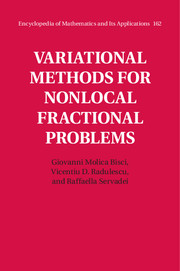Book contents
- Frontmatter
- Dedication
- Contents
- Foreword
- Preface
- Part I Fractional Sobolev spaces
- Part II Nonlocal subcritical problems
- Part III Nonlocal critical problems
- 14 The Brezis–Nirenberg result for the fractional Laplacian
- 15 Generalization of the Brezis–Nirenberg result
- 16 The Brezis–Nirenberg result in low dimension
- 17 The critical equation in the resonant case
- 18 The Brezis–Nirenberg result for a general nonlocal equation
- 19 Existence of multiple solutions
- 20 Nonlocal critical equations with concave-convex nonlinearities
- Bibliography
- Index
19 - Existence of multiple solutions
from Part III - Nonlocal critical problems
Published online by Cambridge University Press: 05 March 2016
- Frontmatter
- Dedication
- Contents
- Foreword
- Preface
- Part I Fractional Sobolev spaces
- Part II Nonlocal subcritical problems
- Part III Nonlocal critical problems
- 14 The Brezis–Nirenberg result for the fractional Laplacian
- 15 Generalization of the Brezis–Nirenberg result
- 16 The Brezis–Nirenberg result in low dimension
- 17 The critical equation in the resonant case
- 18 The Brezis–Nirenberg result for a general nonlocal equation
- 19 Existence of multiple solutions
- 20 Nonlocal critical equations with concave-convex nonlinearities
- Bibliography
- Index
Summary
In this book, starting from Chapter 14, we have considered the nonlocal counterpart of the famous Brezis–Nirenberg result in [46], and we have given some existence theorems. The first multiplicity result for problem (14.1) was proved by Cerami, Fortunato, and Struwe in [62], where it was shown that in a suitable left neighborhood of any eigenvalue of - Δ (with Dirichlet boundary data), the number of solutions is at least twice the multiplicity of the eigenvalue. The authors also gave an estimate of the length of this neighborhood, which depends on the best critical Sobolev constant, on the Lebesgue measure of the set where the problem is set, and on the space dimension.
Later, in [63] the authors proved that in dimension n ≥ 6 and for λ > 0 less than the first eigenvalue of - Δ (with homogeneous Dirichlet boundary conditions), problem (14.1) has at least two nontrivial solutions, one of which is a changing-sign solution (for other results on changing-sign solutions, see, e.g., [70, 191, 213]). More recently, in [88] the authors improved the result in [63], while in [87] Devillanova and Solimini proved the existence of infinitely many solutions for (14.1), provided that the dimension n ≥ 7 and the parameter λ is positive. Finally, in [70] the authors showed that for n ≥ 4, problem (14.1) has at least (n + 1)/2 pairs of nontrivial solutions, provided that λ > 0 is not an eigenvalue of - Δ, and (n+1-m)/2 pairs of nontrivial solutions if λ is an eigenvalue of - Δ with multiplicity m < n +2. When m ≥ n + 2, [70] gave no information about the multiplicity of solutions for (14.1) when λ is an eigenvalue of -Δ. A partial answer to this question was given in [67], where the authors showed that when n ≥ 5 and λ ≥ λ1, then problem (14.1) has at least (n +1)/2 pairs of nontrivial solutions.
A natural question is whether all these results can be extended to the fractional nonlocal counterpart of (14.1), that is, to the problem (14.2) or its generalization.
The aim of this chapter is to focus attention on the multiplicity of solutions for (18.8). In particular, the starting point is the paper [62], and the goal is to extend the results obtained there to the nonlocal fractional setting.
Information
- Type
- Chapter
- Information
- Variational Methods for Nonlocal Fractional Problems , pp. 337 - 343Publisher: Cambridge University PressPrint publication year: 2016
